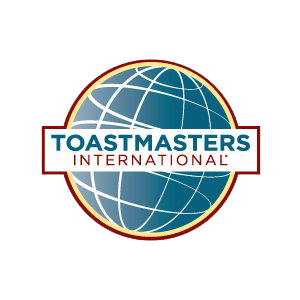Meeting Roles Descriptions
The success of a club meeting depends on the participants. At each meeting, there are many roles to fill and they play an important part in making the club experience enjoyable. Each role lets you develop and improve your skills. Below is a description of each role.
Remember Toastmasters is a self-paced program. Meeting roles are of varying complexity and VIP Online Toastmasters encourages new members to take on roles that are the right fit for them as they continue to attend meetings.
Use the quick links below to learn more about each of the meeting roles.
Quick Links
Toastmaster of the Meeting
The Toastmaster is a meeting's director and host.
The Toastmaster of the meeting has the key role in the success of the meeting. The primary duty of the Toastmaster is to ensure a well-run, on-time, up-beat meeting and act as a genial host to smooth the transition between program participants.
You’ll work on the art of introductions and lectern etiquette.
General Evaluator
The General Evaluator evaluates everything that takes place during the club meeting.
This role affords you the opportunity to expand your coaching skills beyond speeches. You are learning to evaluate key functionaries, coaches, and the meeting as a whole. Special emphasis is placed on coaching the Table Topics Master and the Toastmaster. Ideally, this role is held after you’ve coached at least 2 speeches.
Meeting Speaker
Every speaker is a role model and club members learn from one another's speeches.
Taking on this role improves critical thinking, confidence and public speaking skills
As a meeting speaker, you:
- Prepare, rehearse and present a speech during the club meeting.
- Arrive early to make sure the microphone, lectern and lighting are working and in place.
- Discuss your goals, strengths and weaknesses with your evaluator prior to giving your speech.
Speech Evaluator
Evaluators provide verbal and written feedback to meeting speakers.
After every prepared speech, speakers receive both written and oral evaluations. As Speech Evaluator, you are the speaker's "mentor of the moment." Your goal is to help the speaker become less self-conscious and to make the speech a positive learning experience. In addition, your oral evaluation is an opportunity for you to practice your own speaking and organization skills.
Topicsmaster
Taking on this role improves organization skills, time management and facilitation skills.
The Topicsmaster (Table Topics Master) gives members who aren’t assigned a speaking role the opportunity to speak during the meeting. The Topicsmaster challenges each member with a subject, and the speaker responds with a one- to two-minute impromptu talk.
Don't underestimate the Topicsmaster role’s importance. Not only does it provide you with an opportunity to practice planning, preparation, organization, time management and facilitation skills; your preparation and topic selection help train members to quickly organize and express their thoughts in an impromptu setting.
Table Topics Speaker
Table Topics helps members develop their impromptu speaking skills.
Taking on this role improves confidence and impromptu speaking skills.
Table Topics® is a long-standing Toastmasters tradition intended to help members develop their ability to organize their thoughts quickly and respond to an impromptu question or topic.
- Table Topics typically begins after the prepared speech presentations.
- The Toastmaster will introduce the Topicsmaster, who will give a brief description of Table Topics and then call on respondents at random.
- Your response should express your thoughts clearly and succinctly, lasting one to two minutes.
Timer
Taking on this role improves time management skills.
One of the lessons to be practiced in speech training is that of expressing a thought within a specific time. The Timer is the member responsible for keeping track of time. Each segment of the meeting is timed. This exercise is an excellent opportunity in practicing communicating instructions–something that we do every day.
'Ah' Counter
The purpose of the Ah-Counter is to note any overused words or filler sounds.
The purpose of the ‘Ah’ Counter is to note words and sounds used as a crutch or pause filler by anyone who speaks during the meeting. Words may be inappropriate interjections such as “and, well, but, so, you know, etc.” Sounds may be “ah, um, er.” You should also note when a speaker repeats a word or phrase.
This role requires your very best listening skills and gives you a chance to closely examine the speaking patterns used by others.
Grammarian/Wordsmith
The Grammarian helps club members improve their grammar and vocabulary.
Being Grammarian is truly an exercise in expanding your listening skills.
More than 300 million people in the world speak English and the rest, it sometimes seems, try to… English is a curiously expressive language and the Grammarian's job is to observe how it is used... the good, the bad and the ugly.
Additionally at each meeting, the Grammarian acts as the Wordsmith introduces the "word of the day". The purpose of the Word of the Day is for all members to learn a new word (or a frequently mis-used word), apply it during the meeting, and hopefully retain it for future use.

VIP Online Toastmasters
“The information on this website is for the sole use of Toastmasters’ members, for Toastmasters business only. It is not to be used for solicitation and distribution of non-Toastmasters material or information.”
Toastmasters International